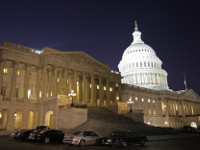Will Russia survive America's debt default?
U.S. President Barack Obama said that the conservative wing of the Republican Party could lead the U.S. to a default on public debt. Experts agree that this is an internal political crisis, but it will affect the countries that have invested in U.S. Treasuries. Since 2009 Russia has been consistently reducing the share of this investment in its state currency reserves.
The situation in the U.S. has become critical when on October 2nd President Barack Obama and Congress were not able to agree on the budget for the next fiscal year. The stumbling block once again was the country's government debt ceiling that the Republicans have refused to approve at the level proposed by Obama. This led to the cessation of the functioning of all state institutions from October 1st (the beginning of the new fiscal year in the U.S.).

The Americans have been living in debt and are so embroiled in the debt grinder (today the country's debt is 16.7 trillion dollars) that they cannot stop borrowing. They can borrow less, but to do this President Obama, for example, would have to give up his costly health care reform. This is what the Republicans suggested in exchange for the approval of the budget. Obama has not agreed to it because this is his main creation and election campaign promise - to give the Americans a unified national health insurance. The money for this and other budget programs of the U.S. government comes from printing US Treasuries and selling them in the domestic and foreign markets. The United States cannot borrow limitless amounts of money as there is the government debt ceiling that Democrat Obama cannot agree upon with the Republican majority in Congress.
The Republicans once again blackmailed Obama saying that they would not approve a new ceiling. In this case the government will not be able to print new bonds, will have nothing to sell, nothing to contribute to the budget, nothing to pay the interest with on the existing loans. Then everyone who bought the US Treasuries will begin getting rid of them in a hurry. China, Japan and other Asian countries have Treasuries bonds in their foreign exchange reserves amounting to 5 trillion dollars. If they were to get rid of them at the same time, the U.S. financial system would collapse. The U.S. government would become insolvent. It would be unable to pay pensions, salaries to state employees, including the state apparatus, or implement their military programs. This would be a default on the public debt.
This fear of bankruptcy has been stopping the determination of the Republicans to punish Obama for his populist, in their opinion, decisions. Their job is to tell people: "It's your president. He is incompetent and does not know how to do anything," but not to bring the country to a collapse. For that reason nearly all experts assure that the situation with negotiations in the United States will be resolved. This expert opinion is not shared by the U.S. lawmakers who are now openly discussing the ways to deal with the default that can be launched in October if they do not approve raising the debt ceiling.
Several conclusions can be drawn from this situation. First, something is definitely coming, otherwise China would not have sold since March nearly 30 percent of Treasuries from its 66-billion dollar portfolio of long-term bonds and stocks. In July they sold bonds in the amount of 6.4 billion, and instead bought 20 billion of bonds issued by the U.S. Government organizations.
Second, this crisis is, of course, an internal political American crisis, but it is also a global crisis. According to the report of the Central Bank of the Russian Federation, in late June Russia had U.S. treasury bonds with average maturity of about 4 years, worth 138 billion dollars (in 2009 the amount was 401.1 billion dollars). This is a large sum, but not critical for the Russian foreign exchange reserves estimated at over 540 billion in April of 2013. Still, the loss of such a sum, of course, would affect the budget of the Russian Federation and its social programs.
Third, the debt crisis is a powerful leverage against the U.S. that can be used if there is a need to act decisively (for example, on the Syrian issue). The Russian official statements regarding its possible actions with the US Treasuries would ensure the growth yield of U.S. Treasury securities, which would cause panic in global financial markets.
How would a layman recognize a default on the government debt? The first sign of it would be the announcement that the U.S. stopped servicing the interest on previously issued treasury notes, Valery Garbuzov, deputy director of the Institute of USA and Canada, told Pravda.Ru.
Lyuba Lulko
Pravda.Ru
Subscribe to Pravda.Ru Telegram channel, Facebook, RSS!


